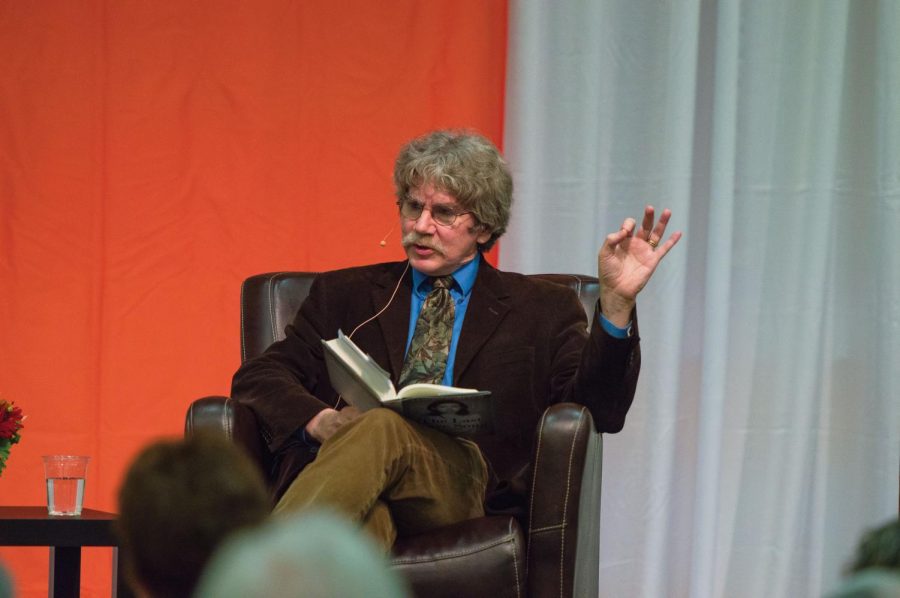The last love song
December 3, 2015
Nearly 200 people gathered in the CH2M Hill Alumni Center Wednesday night to listen to Oregon State University Professor emeritus Tracy Daugherty discuss “The Last Love Song,” a biography telling the story of Joan Didion, one of America’s most prominent authors, according to Daugherty.
Daugherty, clad in a chocolate colored jacket, light blue shirt, a floral tie and his tousled graying hair parted down the middle was joined on stage by Keith Scribner, an author and professor in the School of Writing, Literature and Film in OSU’s College of Liberal Arts.
“The Last Love Song,” is Daugherty’s latest work. Chronicling the life of Didion, one of the premiere American authors of the twentieth century, Daugherty talked about the process of writing the biography, and discussed Didion herself. Audiences young and old sat attentively while Scribner engaged in conversation with Daugherty on stage.
“Why Joan Didion?” Scribner said. “Why did you choose her as the subject for your third biography?”
Daugherty said Joan Didion was a natural choice and that her work in nonfiction and his desire to write about an author of that genre matched up well.
According to Daugherty, Didion is highly regarded as a master author whose work influenced many and is a prominent part of American history. Her style and voice, as well as the fact she was a woman touching on topics that were previously considered taboo, set her apart from other authors, Daugherty said.
“She wrote our history, and she wrote it to music,” Daugherty said. “To understand her words though, you have to understand her music.”
The conversation continued for nearly forty minutes and covered a wide array of topics relating to Didion and Daugherty’s experience writing the biography.
Daugherty touched upon sources and the process of gathering information for the book. Didion herself had refused to work with Daugherty, so his information came from friends, colleagues and others who had worked with her throughout the years. According to Daugherty, his best source was Didion’s first serious boyfriend, although he took over three years to track down and interview.
Didion’s refusal to cooperate did not upset Daugherty though. He had even expected this would be the case from the beginning.
“Authorized biographies have their disadvantages: If Didion was looking over my shoulder she’d have wanted me to write the book her way which is something I certainly did not want,” Daugherty said.
At the end of the conversation, the audience was invited to participate in a question and answer session with Daugherty.
Scribner related one question revolving around Didion’s involvement with politics and her writings on the state of America and the government to current events.
“With America’s gun fascination and myths surrounding that, I wonder what Didion would have to say,” Scribner said.
As Daugherty pointed out several times during the night, his biography examined the inspiration and events surrounding Didion and her work.
Daugherty’s closing lines summarized his admiration for, and interest in Didion.
“With what is going on in our culture now, we could use some Joan Didion,” Daugherty said. “I miss her, I miss her perspective.”
Daugherty ended the evening with a book signing.

















































































![Newspaper clipping from February 25, 1970 in the Daily Barometer showing an article written by Bob Allen, past Barometer Editor. This article was written to spotlight both the student body’s lack of participation with student government at the time in conjunction with their class representatives response. [It’s important to note ASOSU was not structured identically to today’s standards, likely having a president on behalf of each class work together as one entity as opposed to one president representing all classes.]](https://dailybaro.orangemedianetwork.com/wp-content/uploads/2025/03/Screenshot-2025-03-12-1.00.42-PM-e1741811160853.png)























